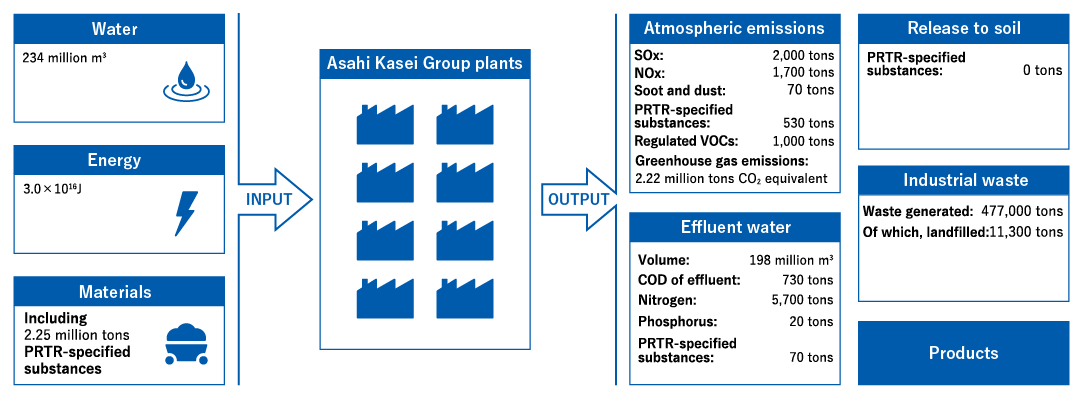Environmental Management
Policy
As expressed in our Group Vision that includes "harmony with the natural environment," the Asahi Kasei Group places high priority on environmental initiatives. The Group Policy regarding global environmental measures is shown below.
The Asahi Kasei Group's Global Environmental Policy
1. Building a low-carbon society
- (1)Taking into account Japan's Plan for Global Warming Countermeasures and Nippon Keidanren's "Proposal on Japan's long-term growth strategy under the Paris Agreement," the Asahi Kasei Group aims for greenhouse gas emissions related to its business activities to meet reduction targets by 2030.
- (2) The Asahi Kasei Group will promote energy conservation across the full range of our business activities with the aim of preventing global warming and conserving limited resources.
- (3)The Asahi Kasei Group will develop a plan to reduce CO2 (Scope 3) emissions from its supply chain.
- (4)The Asahi Kasei Group will help create a low-carbon society incorporating our proprietary technologies, contributing to the reduction of global greenhouse gas emissions by providing products, technologies, and services to the global market.
2. Preserving water resources
The Asahi Kasei Group will contribute to preserving global water resources through our water purification membrane module business, water recycling service business, and the sale of water quality monitoring equipment and wastewater treatment products. It will measure the quantity of its water intake while striving to maintain and improve the efficiency of its water usage.
3. Building a Circular Economy
The Asahi Kasei Group will promote the reduction of environmental impacts and the efficient utilization of resources and energy throughout the entire life cycle in its business activities in order to contribute to a circular economy. Specifically, it will promote the 3Rs of Reduce, Reuse, and Recycle, and increase the usage of resources and energy with lower environmental impacts as well as renewable resources and energy.
4. Achieving harmony with nature
The Asahi Kasei Group will give due consideration to the conservation of natural capital and biodiversity, and promote the reduction of environmental impacts of its business activities. We will also monitor and carefully manage our use of land and biological resources.
5. Improve the level of management at our overseas plants
The Asahi Kasei Group will create monitoring items that enable environmental management practices equivalent to those at its plants in Japan.
6. Collaboration with our supply chain partners
The Asahi Kasei Group will proactively collaborate with members of its supply chain to undertake the abovementioned activities.
Management System
The Group's global environmental countermeasures are part of our activities for ESH & QA, and we have established a management system based on ISO 14001 requirements.
Please see below for our ESH & QA promotion framework.
Targets and results
Based on the Asahi Kasei Group's Global Environmental Policy, we promote activities with the following indicators and targets. Regarding climate change measures, we have set greenhouse gas emissions reduction targets to be met by 2030.
Quantitative indicators and targets of global environmental measures
1. Building a low-carbon society
- GHG emissions
- By 2050, carbon neutral
By 2035, emissions reduction of 40% or more (from fiscal 2013)
By 2030, emissions reduction of 30% or more (from fiscal 2013) - Clean power generation
- Maintain use of biomass fuel at 60% or more by energy content in mixed combustion at the biomass power plant in Nobeoka.
2. Energy management target
- Management target
- Improve unit energy consumption by an annual average of at least 1% over a 5-year period.
3. Water resource preservation activity target
Details of activities and achievements for fiscal 2023 are posted here.
Our response concerning CDP 2024 for fiscal 2024 are posted here.
Environmental impacts
The diagram below describes the environmental impacts of business activities at Asahi Kasei Group plants.
 Asahi Kasei Group (domestic) Main Environmental Impacts (FY2023)
Asahi Kasei Group (domestic) Main Environmental Impacts (FY2023)
- Notes:
- ・Energy consumption includes hydroelectric power generation (based on the Energy Saving Act conversion) Energy consumption including overseas consumption is 3.8×1016 J.

- ・The conversion factor for electricity used to calculate energy consumption is 3.6 GJ/MWh.
- ・Figures with
 have received independent assurance by KPMG AZSA Sustainability Co., Ltd. (March 2025 updated)
have received independent assurance by KPMG AZSA Sustainability Co., Ltd. (March 2025 updated)
Violations and fines related to environmental laws and regulations, etc.
There were no violations or fines related to environmental laws and regulations in fiscal 2023.
